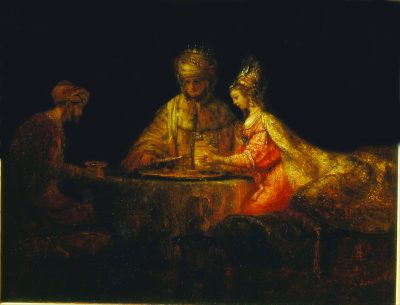
by: Kathy DeGagné, BFP Staff Writer

“Ahasuerus, Haman and Esther” by Rembrandt Photo Credit: Public Domain/ Wikipedia
In 450 BC, a lovely Jewish girl named Esther became queen of the vast Persian Empire, which stretched from India to the Upper Nile region. At that time, an evil man named Haman was appointed the highest official in the king’s court and given much power. When the queen’s cousin, Mordecai, refused to bow down to him, Haman became enraged. Seizing the opportunity, he schemed to annihilate all the Jewish people. Queen Esther interceded before the king, at the risk of her own life, and rescued her people from certain death.
In an amazing turn of events, Haman was hanged on the gallows he’d intended for Mordecai, and Mordecai received Haman’s position and property. The dreadful day designated for the slaughter of the Jews turned into a day of victory and joy. God’s name is never mentioned in the book of Esther, but His invisible hand is evident in every detail of the story.
The Feast of Purim (pronounced pooh-REEM or POOH-rim) comes from the Hebrew word for “lots” and refers to the lot that Haman cast to determine which day the Jews would be slaughtered. Today, Purim is celebrated on the fourteenth day of the month of Adar on the lunar calendar (February or March). Scripture tells us that the holiday was to include “feasting and joy, and of sending presents one to another, and gifts to the poor…that these days should be remembered and kept throughout every generation…” (Esther 9:22b,28a).
This appointed time is remembered every year with the reading of the Megillah (Scroll of Esther). It’s not the solemn, dignified reading you would expect—joy literally explodes in a usually sedate synagogue. The room erupts in hisses, boos, stomping feet, and the whir of spinning rattles every time the name of Haman is mentioned. His name is literally drowned out by the noise. To some, the holiday may seem rather absurd, but for Jewish people down through the ages, humor has often kept them resilient and hopeful through times of great persecution and danger.
A Polish-born survivor of the Holocaust was a young teenager living in the Lodz Ghetto when he was taken to Auschwitz. In the death camp on Purim, eighty skeletal men in his barracks gathered to hear him read the Megillah. They took a piece of potato and a small piece of bread and passed it around to fulfill the mitzvah (Hebrew for “commandment”) of giving gifts of food to one another, and then this young boy read aloud the story of Esther, Mordecai, and Haman.
“When I read aloud about Haman’s downfall…the spark of hope deep inside every Jew’s heart ignited into a flaming torch…When I finished, everyone cheered. For a brief instant, the dreadful reality of the death camp had been forgotten, all the hunger and suffering had receded. Having exerted all my remaining energy in my reading of the Megillah, I sat breathless, but with my spirit soaring… And like a river overflowing its banks, the festive atmosphere and the vision of redemption burst out of the broken hearts of the camp inmates…” (J.J. Cohen).
The reading of the Scroll of Esther was a reminder to those eighty men in the death camp that the Lord who delivered the Israelites from the genocide planned by that evil man from Persia 2,500 years ago, was the same God who was at work to perform a miracle of rescue and redemption in their midst. Ultimately redemption did come for the Jews who endured the Holocaust, though millions paid the price with their lives.
Today, Israel looks to God for deliverance from another evil man from Persia (modern-day Iran). Israelis, who face a constant barrage of hateful invective (and rockets) from unfriendly neighbors, celebrate the Feast of Purim as a continual reminder that the God of Israel is well able to rescue His people from destruction, just as He did for their forefathers thousands of years ago. As a young Jewish man once told me: “The IDF is good, but ultimately, it won’t be the IDF that saves Israel—it will be the Lord Himself.”
All logos and trademarks in this site are property of their respective owner. All other materials are property of Bridges for Peace. Copyright © 2025.
Website Site Design by J-Town Internet Services Ltd. - Based in Jerusalem and Serving the World.